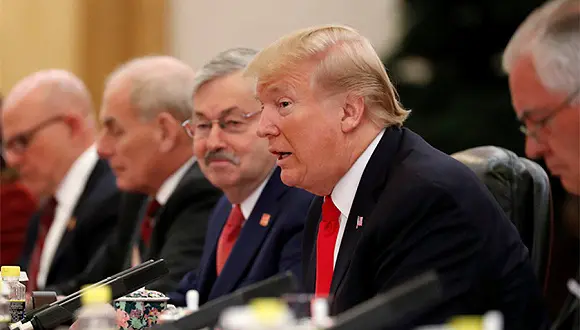Policemen stand guard during a protest in Dhaka, Bangladesh. Activists of Jamaat-e-Islami demand the release of their top leader. At least 40 people injured and more than 104 vehicles were vandalized during clashes between police and the activists. (Xinhua/Shariful Islam)
At least four people, including a policeman, were killed in political violence triggered by Thursday 's hartal (strike) called by Bangladesh Jamat-e-Islami party demanding the release of its leaders who face charges of war crimes.
Jamaat called the nationwide hartal on Thursday after it was obstructed from holding a rally Wednesday as part of its continuing protest over war crime trials.
The party said in a press release it called the hartal for unconditional release of its detained top leaders including its spiritual leader Ghulam Azam.
Jamaat also called for an immediate end to "the mockery in the name of so-called trial," and cancellation of two war crime tribunals.
In the early hours of the hartal which started at 6:00 a.m. local time, incidents of clash, arson, vandalism, chase and counter-chase and detention have also been reported in parts of capital Dhaka and elsewhere in the country.
A Jamaat leader from Bogra district, some 197 km northwest of Dhaka, told Xinhua that "two of our party men died from injuries Thursday evening after they were stabbed by ruling party cadres while returning after hartal picketing."
The Jamaat leader who preferred to be unnamed said "ruling party cadres backed by police also attacked on our peaceful demonstration during the hartal hours."
"Two men died from stab wounds in a hospital Thursday evening, " Mozzammel Haque, Bogra police chief, told Xinhua.
But he could not confirm whether the deceased had connection with Jamaat politics. Haque denied that members of the ruling party attacked on Jamaat with the support of police during the hartal hours.
In protest against the ruling party men's attack, Jamaat, however, called dawn-to-dusk hartal in Bogra for Saturday.
Jamaat men reportedly exchanged gunfire with police until Paramilitary Border Guard Bangladesh (BGB) troops were called in to help control the violence.
Earlier in the day a policeman became one of the first victims as he died of shock after clashes with pro-hartal activists in the country's southwestern region Thursday morning.
"Police constable Johurul Haque, who was shocked by pro-hartal activists during violent clashes, died in a hospital Thursday morning from cardiac arrest," Joydev Bhadra, police chief in Jessore,some 164 km southwest of capital Dhaka, told Xinhua over phone.
Haque was injured as pro-hartal activists pelted brick chips on the law enforcers as they dispersed a rally of the Bangladesh Jamaat-e-Islami party men at about 5:30 a.m. local time, about half an hour before the nationwide hartal began.
In Sylhet, some 241 km northeast of capital Dhaka, an activist was reportedly killed in a clash between two factions of former Prime Minister Khaleda Zia's Bangladesh Nationalist Party (BNP) over trifling matter during hartal picketing.
BNP extended support to its main ally's hartal which was observed till the dusk elsewhere in the country.
Apart from this, dozens of people, including protesters and policemen, were injured in clashes in major cities and towns including Dhaka where traffic on the streets remained thin as most private vehicles were kept indoors.
Most shops and other business establishments also downed their shutters and motorized vehicles were rare on the usually-clogged city streets.
Thousands of anti-riot police and ruling party men were in the streets of Bangladesh's capital city as Jamaat men launched hartal in capital Dhaka and southeastern Chittagong seaport city for half day since Thursday morning to cripple normal life and business transaction to some extent with many main markets and educational institutions closed.
Riot police shot rubber bullets and lobbed tear gas shells to disperse protesters who attempted to block roads and bring out procession along the major city streets disrupting traffic.
Although inter-district buses stayed off the roads, the authorities claimed that operation of trains and flights was usual. The ruling party activists were seen to stage anti-hartal procession on many city streets.
Authorities deny the calls of Jamaat, saying the party is creating anarchic situation in the name of political programs aimed at foiling ongoing war crimes trial.
After returning to power in January 2009, Sheikh Hasina, daughter of Bangladesh's independence hero Sheikh Mujibur Rahman, established the tribunals in March 2010 almost 40 years after the 1971 fight for independence from Pakistan, allegedly to castigate those committed crimes against humanity during the nine-month war.
Apart from Jamaat, BNP has also dismissed the court as a government "show trial" and said it is a domestic set-up without the oversight or involvement of the United Nations. Muslim-majority Bangladesh was called East Pakistan until 1971. Hasina's government said about 3 million people were killed in the war although independent researchers think that between 300,000 and 500,000 died.
 简体中文
简体中文

